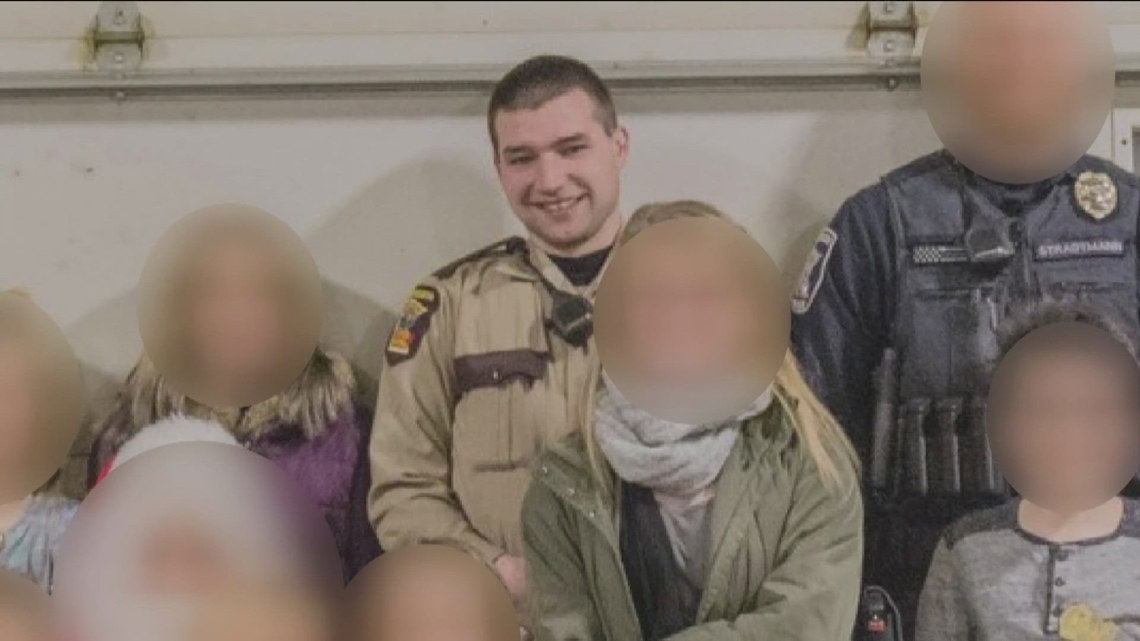Star Tribune
Firefight at Doc’s Landing in White Bear Lake injured two, lodged bullets in bar

Prosecutors have charged two men for a firefight that lodged bullets into the side of a popular White Bear Lake sports bar.
Kardell Baraka Otae Jackson, 49, was charged Friday with second-degree assault and illegal possession of a firearm and ammunition in connection with a Sept. 24 firefight outside of Doc’s Landing.
The other man involved in the shooting turned himself in days afterward. White Bear Lake Police Chief Dale Hager said that man was charged and released from custody, but it’s unclear what those charges are. Ramsey County Attorney’s Office spokesman Dennis Gerhardstein said that man’s case is under review so charging details were not available Friday. The Star Tribune normally does not name suspects until they are charged.
According to charging documents against Jackson:
Bar surveillance video captured two men arguing inside the bar about 12:50 a.m. One of the men, identified as Jackson, held a pool cue as if he was going to hit the man he was arguing with before two women and a man intervened. Jackson left the bar and ran to a light-colored Chevrolet Tahoe in the parking lot. The other man allegedly ran toward Jackson with a pistol in hand.
Jackson fired at him, scattering debris as his bullets hit the side of Doc’s Landing. The man chasing Jackson took cover behind a white Tesla as the two continued shooting at each other. Bullets struck both vehicles, a bar window, the bar’s rooftop fascia and a dart machine inside. Jackson fled with one of the women who intervened in the bar. The other man left alone in a black GMC Denali.
After both men fled, police found 13 shell casings at the scene as well as one man whose arm was grazed by a bullet inside the bar.
Days later, a man turned himself in to investigators and identified himself as the shooter who argued with Jackson. He explained that he had bumped into a table while at the bar, knocking a glass of soda onto his ex-girlfriend’s sister. The two got into an argument and Jackson, the woman’s boyfriend, intervened.
The two argued before Jackson ran outside. Gunfire erupted, and one of the rounds struck the man in the leg. He was treated at a clinic the next day and said family persuaded him to talk to the police.
Jackson was arrested Sept. 27. He denied being involved in the shooting or argument at the bar that night. Jackson said he was trying to defuse the situation and left, alone, to avoid trouble. He claimed to have no knowledge of how bullet holes appeared in the side of his Tahoe, and denied firing a weapon at Doc’s Landing that night.
Officers who searched Jackson’s SUV found a 9mm handgun and marijuana. It’s unclear whether those items are connected to the shooting. Jackson has previous felonies for domestic assault, check forgery and violating two orders for protection. The domestic assault conviction makes him ineligible to own guns or ammunition.
Star Tribune
Minnesotans reflect on Biden’s apology

Lt. Gov. Peggy Flanagan and her daughter were among the throngs Friday as President Joe Biden delivered the apology that many Indigenous Americans thought would never come.
“I think he really said the things that people have been waiting to hear for generations, acknowledged just the horror and trauma of literally having our children stolen from our communities,” said Flanagan, a member of the White Earth Band of Ojibwe. “It’s a powerful first step towards healing.”
Hundreds of boarding schools operated in the 19th and 20th centuries, separating Indigenous children from their families and forcing them to assimilate to European ways. Many children were abused, and at least 973 died, according to a report from the U.S. Department of the Interior.
Other Minnesotans reacted similarly to Flanagan, saying they welcomed the apology but that additional action is needed to help Indigenous people move forward.
Anton Treuer, a professor of Ojibwe at Bemidji State University, wrote in a newsletter that the apology was “a welcome first step on the journey to healing.”
“There is no way to truly right historical injustices for the children buried at Carlisle, Haskell, and other schools, but these words set a new tone for the country and will help heal the anguish so many Natives have carried for so long,” Treuer wrote. “It gives me hope that we can come together to reconcile and heal our troubled nation.”
Sen. Mary Kunesh, DFL-New Brighton, the first Indigenous woman to serve in the state Senate, called Biden’s apology encouraging.
“This recognition of past wrongdoings is an important step towards healing relationships between the United States and the sovereign nations affected by these past systems,” Kunesh said in a statement. “This dark period of American history must be remembered and taught.”
Star Tribune
MPD on defensive after man shot in neck allegedly by neighbor on harassment tirade

“I have done everything in my power to remedy this situation, and it continues to get more and more violent by the day,” Moturi wrote. “There have been numerous times when I’ve seen Sawchak outside and contacted law enforcement, and there was no response. I am not confident in the pursuit of Sawchak given that Sawchak attacked me, MPD officers had John detained, and despite an HRO and multiple warrants — they still let him go.”
On Friday, five City Council members sent a letter to Mayor Jacob Frey and Police Chief Brian O’Hara expressing their “utter horror at MPD’s failure to protect a Minneapolis resident from a clear, persistent and amply reported threat posed by his neighbor.”
Council Members Andrea Jenkins, Elliott Payne, Aisha Chughtai, Jason Chavez and Robin Wonsley went on to allege that police had failed to submit reports to the County Attorney’s Office despite threats being made with weapons, and at times while Sawchak screamed racial slurs. Sawchak is white and Moturi is Black.
The council members also contend in their letter that the MPD told the County Attorney’s Office that police did not intend to execute the warrant for “reasons of officer safety.”
At a Friday afternoon news conference at MPD’s Fifth Precinct, O’Hara said police had been working to arrest Sawchak since at least April, but “no Minneapolis police officers have had in-person contact with that suspect since the victim in this case has been calling us.” The chief pointed out that Sawchak is mentally ill, has guns and refuses to cooperate “in the dozens of times that police officers have responded to the residence.”
O’Hara put aside the option to carry out “a high-risk warrant based on these factors [and] the likelihood of an armed, violent confrontation where we may have to use deadly force with the suspect.” The preference, he said, was to arrest Sawchak outside his home, but “in this case, this suspect is a recluse and does not come out of the house.”
Star Tribune
Rochester lands $85 million federal grant for rapid bus system

ROCHESTER – The Federal Transit Administration has green-lighted an $85 million grant supporting the development of the city’s planned Link Bus Rapid Transit system.
The FTA formally announced the grant on Friday during a ceremonial check presentation outside of the Mayo Civic Center, one of the seven stops planned for the bus line. The federal grant will cover about 60% of the project’s estimated $143.4 million price tag, with the remaining funds coming from Destination Medical Center, the largest public-private development project in state history.
Set to go live in 2026, the 2.8-mile Link system will connect downtown Rochester, including Mayo Clinic’s campuses, with a proposed “transit village” that will include parking, hundreds of housing units and a public plaza. The bus line will be the first of its kind outside the Twin Cities — with service running every five minutes during peak hours.
“That means you may not even need to look at a schedule,” said Veronica Vanterpool, deputy administrator for the FTA. “You can just show up at your transit stop and expect the next bus to come in a short time. That is a game changer and a life-transformational experience in transit for those people who are using it and relying on it.”
The planned Second Street corridor is already one of the busiest roads in Rochester, carrying more than 21,800 vehicles a day, and city planners have talked for years about ways to reduce traffic congestion in the city’s downtown. Local officials estimate that the transit line, which will rely on a fleet of all-electric buses, will handle 11,000 riders on its first day of operation and save eight city blocks of parking.
Speaking to a crowd of about 100 people gathered on Friday, Sen. Amy Klobuchar said the project shows Rochester is thinking strategically about how it handles growth.
“If you just plan the business expansion, and you don’t have the workforce, you don’t have the child care, the housing or the transit, it’s not going to work very well as a lot of communities across the nation have found,” Klobuchar said.





GIPHY App Key not set. Please check settings